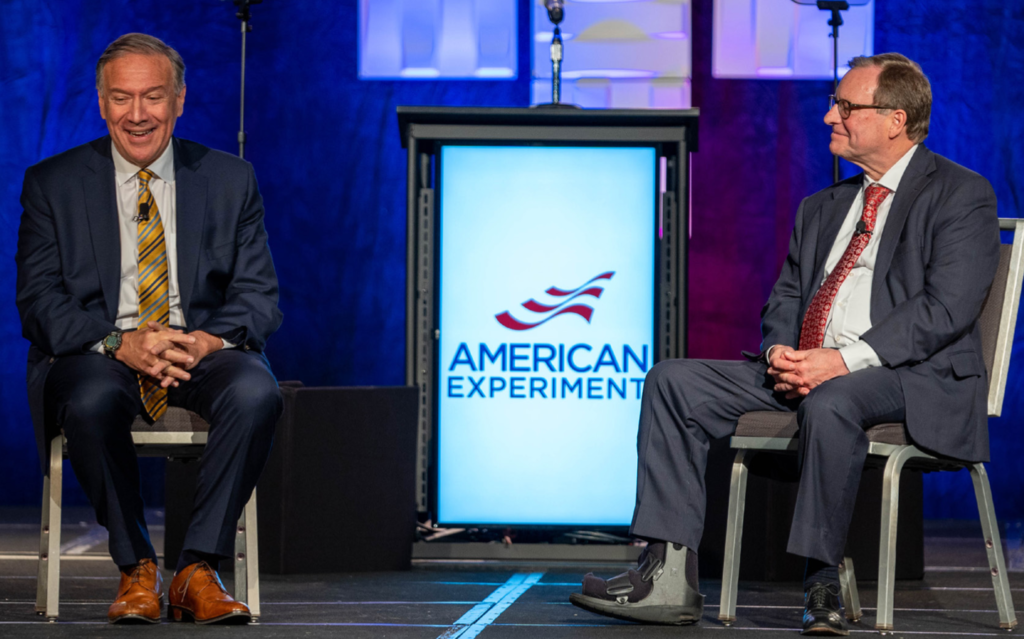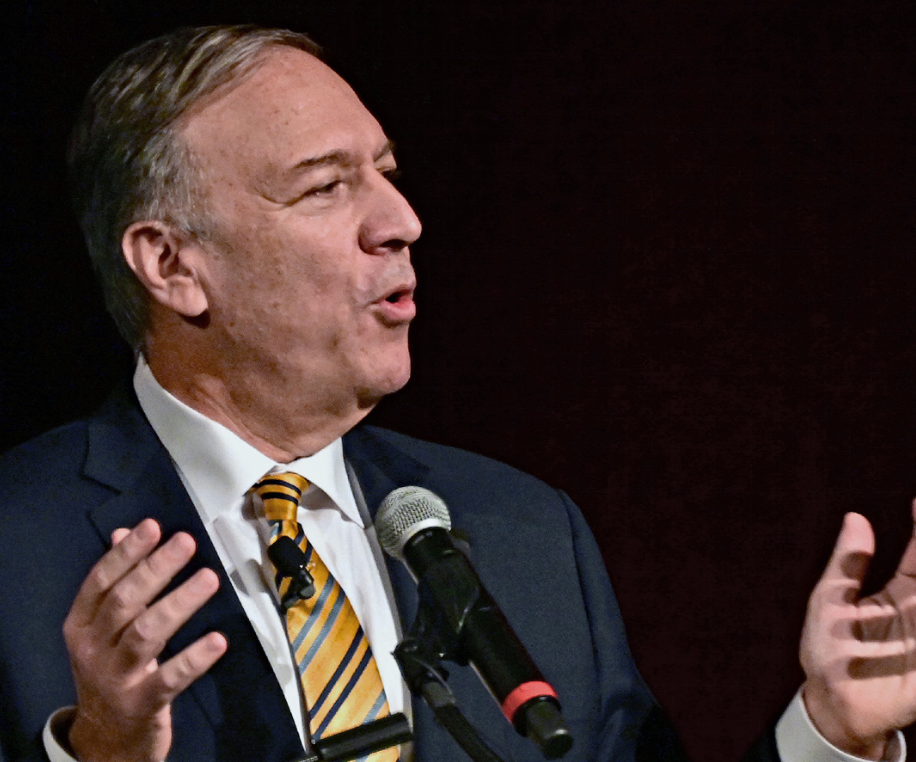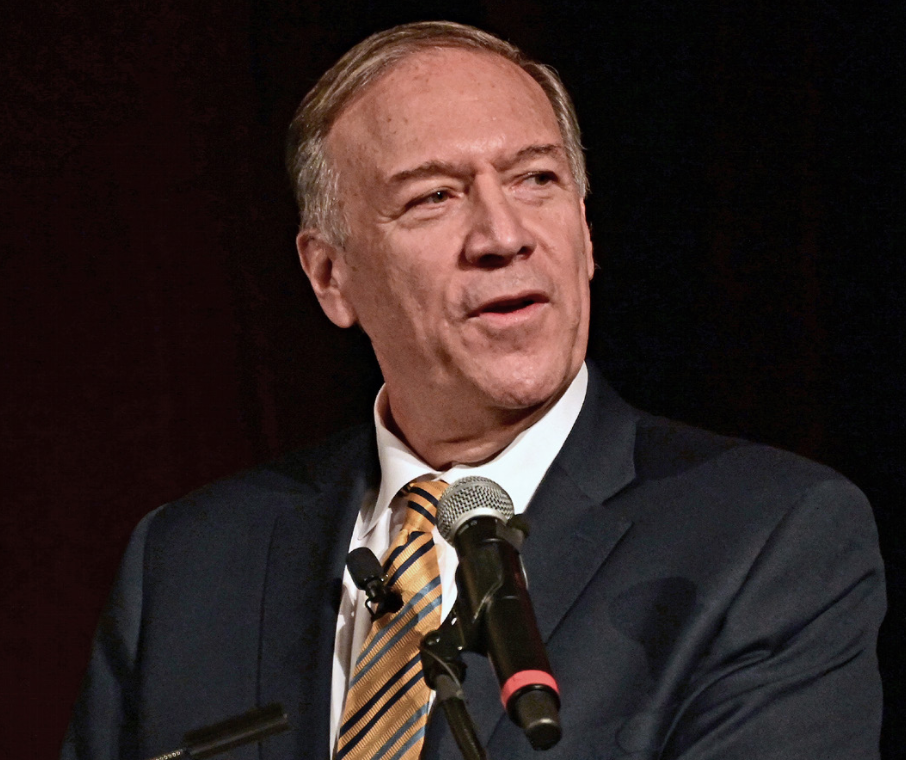Q&A: A muscular America
Former Secretary of State Mike Pompeo tells American Experiment’s John Hinderaker the value of confronting China, showing resolve to Iran, and building a structure of peace in the Middle East.
Mike Pompeo served as director of the Central Intelligence Agency from 2017 to 2018 and as secretary of state from 2018 to 2021.
Pompeo graduated from West Point in 1986 and after his military service attended Harvard Law School. He was elected to the United States House of Representatives from 2011 to 2017, representing Kansas’s 4th congressional district.
Pompeo was the keynote speaker at this year’s Annual Dinner for Center of the American Experiment.
John Hinderaker: Secretary Pompeo, you did a stint as CIA director. Historically, conservatives have supported our intelligence agencies, while liberals have tended to be skeptical of them. But in recent years, it seems as though intelligence officials and former officials have tended to align themselves with Democrats. For example, the claim by a number of them that Hunter Biden’s laptop looked like Russian disinformation. Based on your tenure as CIA director, how trustworthy do you think our intelligence agencies are?
Secretary Pompeo: We’re always right to be skeptical of government. Our intelligence communities are no exception to that. We should demand excellence from them, and we should demand that they are not political. What I observed at the CIA was you have a handful of bad apples — but that’s true everywhere. Mostly you had great Americans trying to do their job. In fact, former Director of the CIA John Brennan didn’t even want to talk about the fact that the CIA stole secrets. He didn’t like the words spying or stealing. The fact is we conducted espionage at the finest levels to support President Trump. The same thing happened at the FBI. He had a group of political leaders — Comey, McCabe, and the gang — who went off the rails. They should be prosecuted to the extent they violated the laws. And the last thing I’ll say, if you know an FBI officer who’s working the street, who’s trying to keep drugs out of your community, or you encounter someone who you learn is working at the CIA, pat them on the back. They are doing hard work. They are great Americans, and they are trying to keep us all safer and more secure. It’s the political leadership that has failed them. That’s who Americans need to be skeptical of.
From being CIA director, you moved on to become secretary of state. How would you describe working in the Trump administration?
It was the privilege of a lifetime, and I am deeply grateful to President Trump for giving me the opportunity. We had the glorious space to break glass, to not be confined by the historic foreign policy understandings, and just say what makes sense. Let’s just go solve problems. Let’s bring our kids home. Let’s bring our kids back from Afghanistan, but let’s do it right. If we want to try to build peace in the Middle East, let’s get after it. The Palestinians are never going to cut that deal. Let’s ignore that. Let’s try and make their lives better, but let’s go build our relationships in the Gulf. Let’s challenge the Iranians to make sure they don’t get a nuclear weapon in ways that no administration has done. And then, maybe most importantly, we confronted the Chinese Communist Party. For the first time since the early ’70s, the United States actually looked that evil leadership in the eye and said, “We’re not going to let you take American jobs. We’re not going to let you steal intellectual property. We’re not going to let you spy on us from your consulates all around America.” Instead of just advocating for buying and selling more trinkets between our two countries, we pulled off the Band-Aid presented by the Chinese Communist Party.

Secretary Pompeo and American Experiment president John Hinderaker discuss America’s foreign policy stance and the most pressing challenges at the Center’s Annual Dinner.
As we speak there is a war going on between Russia and Ukraine. What have we learned so far from that conflict?
Deterrence matters. American leadership matters. I’m asked all the time if this would have happened if I were still there. I suppose at some level it’s unanswerable. I’m not still there, President Trump’s not still there. But I do know this much. It didn’t happen on our watch, and Vladimir Putin hasn’t changed. The only thing that’s changed is American leadership. And if you aren’t prepared to deter, if you’re not prepared to engage with folks like Vladimir Putin and make clear to them that it’ll be costly, then America will suffer, not just the people of Ukraine. You watch what’s happening to these innocent civilians in Ukraine and it breaks your heart. But today we’ve got higher energy prices. There’s going to be real food challenges in good parts of the world come this fall and winter. What happens in Kiev, what happens in Moscow doesn’t just stay in those places. The United States made an enormous mistake by not maintaining the deterrence that we achieved. And the Ukrainian people and now the American people are suffering too.
The Ukraine war as it’s progressed so far has illustrated how important morale is in combat. Some people are concerned that the woke ideologies that seem to be infiltrating our armed forces could adversely impact our own morale. Is that a valid concern?
I’ve written about this. As a former soldier, I’m very worried when I see leadership in the United States military focused on anything but excellence; focused on anything but war fighting; focused on anything but actually being prepared to execute the dangerous mission that the commander in chief will have to call on them to do. And the United States military has always been good about diversity and bringing in those best suited to particular skill sets. But when you begin to focus on diversity, inclusion and equity — when you start to talk about things that aren’t directly related to war fighting, and the capacity to deliver lethal outcomes to your adversaries — not only will you have a less capable fighting force, but morale will fall. We have an all-volunteer service. The young men and women who have always come forward, who have gone to their recruiter’s office and signed up for OCS — they’ve volunteered to serve. They will say, “I don’t want to be part of any organization that doesn’t understand its central mission. And I’ll go take my talents and skills elsewhere.” I’m worried about what this might mean for our military, two or five or 10 years from now.
How serious is the Chinese threat to Taiwan? And is it realistic for the U.S. to commit military force there?
It’s a serious threat to Taiwan, but not just to Taiwan, to Vietnam, to the Pacific islands, to South Korea, to Japan. The Chinese Communist Party intends regional, then global hegemony. They want to run the show. They want the world to live under a set of rules that look like theirs, not ours. And that’s really bad for us here in places like New Hampshire, Iowa, and my home state of Kansas. Our kids could live in a different world. Taiwan is close. It’s an island nation that Xi Jinping, the leader of and the general secretary of the Chinese Communist Party, has made clear he wants to bring into the fold. He talks about reunification, but of course they were never part of China. The threat is real. They are serious and determined. Our mission set is pretty clear. As much as we’re doing today in Ukraine, we can do today in Taiwan. We can give the Taiwanese people the tools they need.

And don’t just think of artillery and ships and rifles. They need all of those things, but they need American know-how and American intelligence. And then they need friends in the region. The Japanese, the South Koreans, the Australians, the Vietnamese, the Malaysians, the Indonesians all have a vested interest in making sure that Xi Jinping does not bring Taiwan into his fold. And we ought to be working on those alliances, building them up, making them stronger, giving the Taiwanese the tools they need to defend themselves. And I’m confident that we can maintain the very deterrents that we maintained for four years in the Trump administration. I can’t imagine that Xi Jinping would’ve undertaken an attack on Taiwan during our time.
The Abraham Accords in the Middle East were one of the real achievements of your tenure as secretary of state. How has that changed the picture in the Middle East? And are those changes secure against what might happen in the Biden administration?
The Abraham Accords are a blessing to the nation of Israel, the Jewish people in their rightful homeland, but more broadly to the region. To every country, including those that signed the Accords, the Bahrainis, the Emirates, the Sudanese, the Moroccans. These were Arab nations, who for decades had as their primary foreign policy objective the destruction of Israel. And they had known for a while that was foolish, that was folly, but they couldn’t cross through. Really remarkable leaders — Mohamed bin Zayed in the Emirates, the Crown Prince in Bahrain, Prime Minister Netanyahu, and President Trump — came together and said, “Let’s move forward, let’s recognize the world as it is, we can make commerce together. We can make security together, and we can push back against the threat from the Islamic Republic of Iran together.” And the Abraham Accords are a result of that. I think they are lasting, not because of any individual, but because they have improved the lives of ordinary people
in each of the countries that are now participating in them. And they’ve made opportunities for American businesses, too. And I’m convinced for that reason and that reason alone, the Abraham Accords will stand the test of history.
You mentioned Iran. How has the killing of Soleimani, their head terrorist, changed the military and political calculus in the region?
The strike on Soleimani mattered for multiple reasons. The first was he was trying to kill Americans. He was actively engaged in a real-time plot to kill more Americans. He had already killed some 500 or 600 Americans in the Iran-Iraq war. Soleimani was the head of the IRGC Quds Force, their external terror operation. He was a bad guy, and he didn’t like America. Even the day we struck him, he was engaged in a mission in Baghdad, Iraq, to build out a plot to kill even more Americans. So, in the first instance, we slowed that down. Second, the world saw what we did. Deterrence matters. It comes from strength. It comes from being real. It comes from actually executing on the things you told people you would do. And we had made a commitment.

We had made a commitment that we were not going to let Iran push us around. They’d shot down two American UAVs, and we had the opportunity to strike their most senior general. It sent notice to the world and to Iraq. And their behavior changed. We saw them change the way they thought about the United States. They knew we were serious. They knew if we drew a line, we were going to defend it, and we didn’t draw lines everywhere. We didn’t send the 82nd Airborne. We didn’t send the 101st Airborne Division. We didn’t send a Marine amphibious force. We used American power in a restrained way to reflect a real situation on the ground. And not only did we place deterrence on stronger footing with Iran, but the whole world noticed. They all saw that the United States was serious and determined.
And finally, we conservatives are free traders, but we have learned in recent years that we need to make some exceptions for the sake of national security. For example, we see the Europeans depending on Russian natural gas, the fact that most of our pharmaceuticals are being made in China. And the fact that the solar panels, wind turbines and raw materials necessary for so-called green energy come overwhelmingly from China.
You and I are both big time free traders. We should never walk away from that. But when we talk about free trade, we know full well that trade occurs under a set of rules, property rights, and contracts, right? Markets, information transparency, all the things that build markets. What we have failed to recognize is that the Chinese Communist Party has for decades not been playing by that set of rules. That’s not the free trade, John, we have known and loved. We know that the things they have done to take advantage of us, destroying our businesses, and putting our national security at risk, aren’t consistent with our free trade ideas. We should demand reciprocal relationships, and we should take those handful of technologies and those handful of tools that do really matter to American national security. We have to make sure that America has access to those.